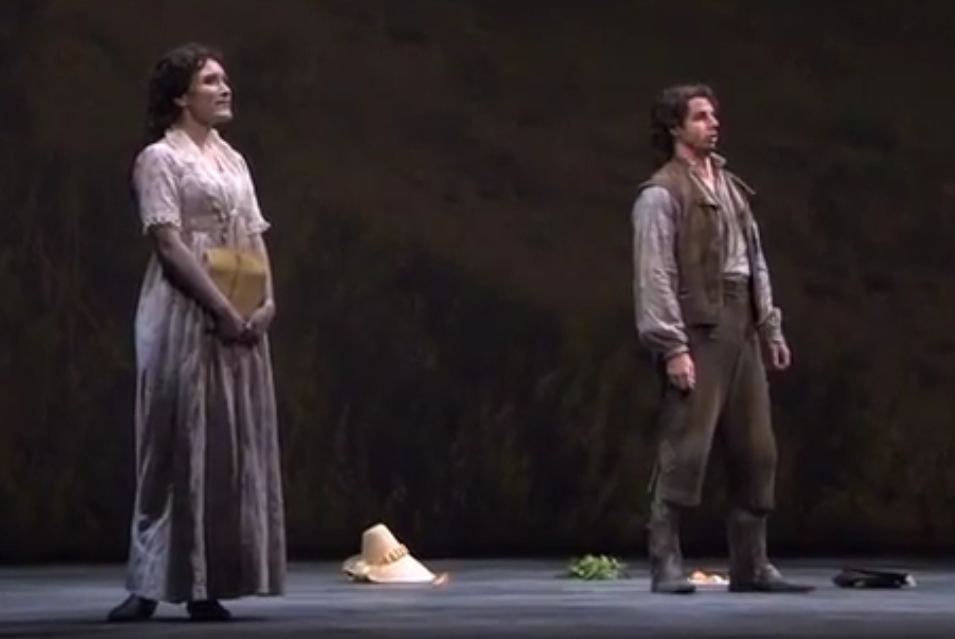
Wuthering Heights in HD
By Patrick Dewane, Minnesota Opera
Above is a first clip of HD video footage of Minnesota Opera’s production of Bernard Herrmann’s Wuthering Heights, a project funded by The John S. and James L. Knight Foundation. The eight-camera shoot before a live audience was a major step into the digital age for a company long known for its artistic innovation. In this case, the only opera by Bernard Herrmann–a composer whose film scores are among the most recognizable music of the 20th century—will now be seen well beyond the fortunate thousands who attended the production in person in downtown St. Paul, Minnesota.
The project also turned conventional wisdom on its head, as it was previously believed that a video shoot of this quality would cost close to $1 million. It didn’t. It cost about a third of that price. Perhaps the success of this project will encourage other companies to record and distribute their own innovative work. In the field of opera, the rise of digital distribution technology is happening at precisely the same time that companies all over the country are commissioning new operas. Over the last decade, formerly conservative companies started producing contemporary operas, often to full houses. It is a startling and welcomed change. Digital technology has the potential to hasten a Golden Age of America opera. In November, The Minnesota Opera will shoot its second HD project, the world premiere of American composer Kevin Puts’ opera Silent Night. The work is based on the true story of the World War I spontaneous Christmas truce, and other opera companies are already planning on producing it in their coming seasons. The HD recording of Silent Night will only add energy to the Minnesota Opera’s larger goal to influence the standard repertoire of opera, making it more American and contemporary. Wuthering Heights beat its ticket sales goal, further proof that these works deserve to be on the same stage as the most beloved classics of the opera repertoire. And the HD recording of Wuthering Heights will stand with the standard repertoire HD productions being distributed by the greatest opera companies in the world.
Relive the fun of Wuthering Heights by enjoying our Bernard Herrmann fun facts published in anticipation of the show. The first two are listed below – click here for the master list.
April 7 Bernard Herrmann wrote the original theme music for the TV show The Twilight Zone. He also wrote music for a few episodes in the first season, music that was recycled in subsequent seasons. Although he was a classically trained composer and symphony orchestra conductor, Herrmann’s orchestrations went far beyond what you’d normally hear in Carnegie Hall. For instance, he is credited as the first person to include a theremin in the orchestration of a movie score. He did so for a 1951 science fiction film, creating the convention that when you hear a theremin you think about zombies or invaders from outer space (or the Beach Boys Good Vibrations). He had a gift for expressing the creepy, which endeared him to his long-time collaborator, Alfred Hitchcock. Rod Serling, creator of The Twilight Zone, idolized radio dramatist Norman Corwyn. Our director for Wuthering Heights, Eric Simonson, won an Oscar in 2006 for his documentary short film about Norman Corwyn’s VE Day radio broadcast On a Note of Triumph, a program heard by 60 million Americans. And, in a The Twilight Zone-like coincidence, Bernard Herrmann wrote the music for On a Note of Triumph.
April 6 Paul McCartney and composer Bernard Herrmann were friends. In fact, the staccato cello in the Beatles song “Eleanor Rigby” came directly from Herrmann’s scores for the movies “Psycho” and “Fahrenheit 451.” This is according to several interviews with McCartney and the Beatles’ producer, Sir George Martin. Then when McCartney was asked to score a movie he called Bernard Herrmann for help. As a thank you, Paul McCartney gave Herrmann a painting by Marc Chagall.
Recent Content
-
Artsarticle ·
-
Artsarticle ·
-
Artsarticle ·
